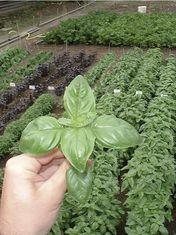
TOZER Seeds is a progressive company which is determined through plant breeding to bring new and better varieties to the market place.
Herbs are a key niche of the company and as it continues to see this area grow it is looking to offer new varieties.
David Rogers, product manager for herbs, says: "We have introduced several new herb varieties in recent years. Humber/VHB asked us to improve lines of coriander and basil for pot production, we have done this but the programme remains ongoing.
"A spin off from this breeding is a coriander which has a citrus flavour that we now market as lemon coriander. We have also introduced a rocket variety called Sky Rocket, which combines the best aspects of salad and wild rocket."
Rogers says the company is keen to push the boundaries further. He says: "We are also keen to trial new and unusual products from around the world. Many herbs are little more than wild plants, so from the point of view of a plant breeder there's a lot of variability to work with, which makes herb breeding such an interesting job."
The growth in the herb market has enabled Tozer to develop. Rogers explains: "Since 1999 we have seen an increase in sales for herb seed by around 500 per cent. A large proportion of this has been due to an increase in demand from the salad pack industry. However, in the past two to three years we have registered an ever-increasing demand for seed into the traditional bunching and pot herb industries. It is this increase in demand that has enabled us to initiate a breeding programme for some herb varieties."
Rogers notes that the shape of the market has altered as consumer tastes have changed. He says: "Coriander is our biggest selling herb line by far, in terms of both field and pot production. Rocket, both wild and salad, has seen phenomenal growth in the past five years or so, and parsley remains a widely grown crop.
"Herb seed sales used to be dominated by curled parsley, other herbs were grown, but only by specialist herb growers. It was only with the advent of the salad pack industry that we began to experience serious demand for other herb types. Since then we have continued to increase our product range and are now trialing new products several times a year."
Rogers feels that Tozer is in a unique position as the only independent UK vegetable breeding company. He says: "We can tailor our breeding to specific customer requirements. The one herb that seems to arouse the most interest in terms of future development is basil.
"Unfortunately basil has a very sensitive leaf, which limits its use as a processed product, if ways can be found to process basil I could envisage a big increase in demand."
The route which breeding takes looks at a variety of concerns. Roger says: "Our breeding looks to either improve herbs in specific directions such as creating lines which are more suited to supermarket pot production, or to improve the plant from an agronomic angle by incorporating disease resistance or by slowing down bolting rates."
The company is also working on other issues, which affect the interests in the products. Rogers explains: "We are working on a number of factors affecting the success of our lines such as chill tolerance and processability."
Looking to the future Rogers is confident that improved communication within the market can only help to strengthen the industry. He says: "In recent years we have seen greater interest in what we do and what we can do from retailers and other end users of our products. This is something we welcome, we feel that the more communication we can have with the industry the better off we will all be."
NEW CHAPTER FOR GENESIS
GENESIS seeds produces and distributes 68 varieties of herb seeds. The Israeli company carries out intensive research on culinary herbs at experimental stations in the Galilee, Negev and with The Agricultural Research Organisation in Nave-Yaar.
Issac Nir, president of Genesis Seeds, feels that the herb market has grown considerably in recent years and future success is dependent upon numerous factors. He says: "The market estimation of herbs in the UK is in the range of £28-30million. This is composed of 25 per cent parsley, 22 per cent coriander, 20 per cent basil, six per cent mint, five per cent thyme and 22 per cent others. The market is made up of a mixture of culinary and mixed herbs and dry, frozen or fresh products. Although the main traditional herbs are parsley, dill, coriander and mint but there is growth in the speciality lines such as basil, chives, thyme, rosemary, marjoram, oregano, tarragon and melissa."
Though there are no new herbs in the Genesis range the company is seeking to introduce new varieties. "We have new varieties of basil, green mustards, melissa, coriander, salvia and thyme," he says. The company is also soon to launch a herb it has been working on. "We are planning to introduce wild Marjoram Sryaca which when compared to Marjoram Marjorama is far more aromatic."
One of the main challenges is the difficulty experienced with shelf-life of products. "Fungus diseases, such as botrytis, can cause rot and it often develops in the high humidity of the package," says Nir. However, he is optimistic about the future of the herb market.
“"The more people are exposed to the media and culinary books the more herbs they will consume. Travelling also brings new experiences. "The more successful the consumer will be using the herbs properly the bigger the market can be," he says.



